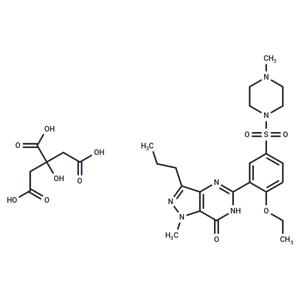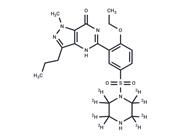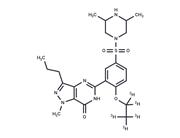| Name | Sildenafil citrate |
| Description | Sildenafil citrate (UK-92480 citrate) , a cyclic guanosine monophosphate (cGMP)-specific phosphodiesterase type 5 (PDE5) Inhibitor, is used extensively for erectile dysfunction and less commonly for pulmonary hypertension. |
| Cell Research | Sildenafil is prepared in DMSO and stored, and then diluted with appropriate medium before use[2]. Cells at approximately 90% confluence are harvested with 0.1% trypsin/0.01% ethylene diamine tetraacetic acid (EDTA) solution and seeded into a 96-well plate at a density of 2×104 cells/well and grown in RPMI-1640 containing 10% FBS for three days, followed by serum starvation for three days. Cells are then incubated for different time with various concentration of serotonin or 1 μM Sildenafil followed by serotonin with or without U0126, as indicated. Control cells are treated in the same way except sterile PBS replaced the drug. After treatment, medium is changed to fresh medium, and cells are incubated with 5 g/L of MTT for four hours. MTT is then dissolved with 150 μL of 10% DMSO for 20 minutes. The optical densities (OD) in the 96-well plates are determined using a microplate reader at 570 nm[2]. |
| Kinase Assay | COX enzyme assay in vitro: Expression of COX protein in insect cells is determined by assessing PG-synthetic capability in homogenates from cells incubated for 3 days with COX-1 or COX-2 baculovirus. Cells expressing COX-1 or COX-2 are homogenized and incubated with arachidonic acid (10 μM). COX activity is determined by monitoring PG production. No COX activity is detected in mock-infected Sf9 cells. Celecoxib are preincubated with crude 1% CHAPS homogenates (2-10 μg of protein) for 10 minutes before addition of arachidonic acid. PGE2 formed is detected by ELISA after 10 minute incubation. |
| In vitro | Within anesthetized canines, Sildenafil citrate enhances erectile function of the penis following pelvic nerve stimulation. In Sprague-Dawley rats, daily administration of Sildenafil (20 mg/kg) improves erectile function in a time- and dose-dependent manner, while concurrently reducing the apoptosis index significantly and increasing the phosphorylation of akt and eNOS. |
| In vivo | In endothelial cells, Sildenafil enhances insulin signaling and nitric oxide (NO) production by mitigating oxidative stress induced by hyperglycemia and elevating intracellular calcium levels (Ca2+). Sildenafil citrate acts as a potent, reversible, selective inhibitor of phosphodiesterase type 5 (PDE5), effectively inhibiting the hydrolysis of cyclic guanosine monophosphate (cGMP) with an inhibition constant (Ki) of approximately 3 nM. |
| Storage | Powder: -20°C for 3 years | In solvent: -80°C for 1 year | Shipping with blue ice. |
| Solubility Information | DMSO : 45 mg/mL (67.5 mM)
|
| Keywords | inhibit | UK92480 | UK-92480 Citrate | UK-92480 | UK 92480 Citrate | Apoptosis | Sildenafil citrate | Inhibitor | Autophagy | UK 92480 | Phosphodiesterase (PDE) | Sildenafil | Sildenafil Citrate | UK92480 Citrate |
| Inhibitors Related | Stavudine | Sodium 4-phenylbutyrate | L-Ascorbic acid | Hydroxychloroquine | Guanidine hydrochloride | Tributyrin | Paeonol | Naringin |
| Related Compound Libraries | Anti-Neurodegenerative Disease Compound Library | EMA Approved Drug Library | Anti-Cancer Clinical Compound Library | Drug Repurposing Compound Library | Inhibitor Library | Anti-Cancer Approved Drug Library | FDA-Approved Drug Library | Anti-Aging Compound Library | Bioactive Compounds Library Max | Anti-Cancer Drug Library |

 United States
United States



